|
|
|
Sort Order |
|
|
|
Items / Page
|
|
|
|
|
|
|
| Srl | Item |
| 1 |
ID:
175700


|
|
|
|
|
| Summary/Abstract |
The emotional dimension of the human element of war remains understudied. This article explores war’s fundamental cognitive frame of mind, adversariality, with a focus on its emotional thread, in the context of battle and war termination. Adversariality itself is discussed with specific reference to Clausewitz before key emotional aspects—emotion causation and consequence, and stress, anger, and fear—are explored from the perspective of the emotions sciences literature. Finally, three brief historical cases demonstrate the importance of the emotional side of strategy: Königgratz campaign in 1866, Germany’s defensive campaign in 1918, and the War of the Spanish Succession.
|
|
|
|
|
|
|
|
|
|
|
|
|
|
|
|
| 2 |
ID:
193167
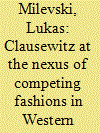

|
|
|
|
|
| Summary/Abstract |
The history of strategic thought is well trodden ground, but has not been approached from a fashion perspective. This article focuses on the issue of engagement among intellectual fashions by examining how events may lead observers to believe that established, long cycle ways of thinking have become partially, if not wholly, inapt, thereby leading to an uncertain and perhaps incomprehensible strategic environment. Newer, revisionist but often short-lived concepts emerge as a consequence, variously complementary to, despite, or in direct repudiation of longer-lived concepts or theories. This dynamic is examined through the interaction between Clausewitzian and competing fashions.
|
|
|
|
|
|
|
|
|
|
|
|
|
|
|
|
| 3 |
ID:
182004
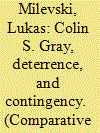

|
|
|
|
|
| Summary/Abstract |
Most scholars as well as practitioners in strategic studies recognize that deterrence is contingent upon the opponent choosing to be deterred. This recognition was a contribution made by Colin Gray to deterrence theory, forcefully if not strictly uniquely, on the basis of the theory of strategy. Although relating the nature of strategy to deterrence led to a powerful reinterpretation of the importance of actor agency in deterrence, it is nonetheless still an incomplete, albeit foundational, appreciation of agency and contingency. To understand fully the role of agency in deterrence, one must also relate it to the nature of political relationships, and thereby identify another contingency point in deterrence.
|
|
|
|
|
|
|
|
|
|
|
|
|
|
|
|
| 4 |
ID:
104742
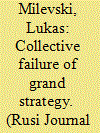

|
|
|
|
|
| Publication |
2011.
|
| Summary/Abstract |
Confusing battle for war and tactics for strategy, the West has found itself unable to counter the 'cumulative strategy' of its opponents. In the winning entry to the 2010 Trench Gascoigne Essay Prize, Lukas Milevski argues that the use of military force must be confined to Schelling's triad of taking, protecting and hurting.
|
|
|
|
|
|
|
|
|
|
|
|
|
|
|
|
| 5 |
ID:
187314
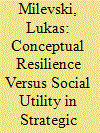

|
|
|
|
|
| Summary/Abstract |
The West produces a lot of strategic thinking, most of it ad hoc responses to present stimuli not only rarely analytically or strategically useful but often damaging existing and useful strategic theory as a consequence. Lukas Milevski applies resilience to strategic theory and contrasts it with its opposite, social utility. Resilience is explained and applied to the particulars of strategic thought. The social utility of ad hoc theory is recognised, notably in attracting attention, which even militaries need to do. The tension between conceptual resilience and social utility should be reflected in strategic education so that the advantages of both are maintained.
|
|
|
|
|
|
|
|
|
|
|
|
|
|
|
|
| 6 |
ID:
135825
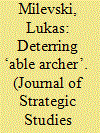

|
|
|
|
|
| Summary/Abstract |
This is a short commentary on Dmitry Adamsky’s recent article ‘The 1983 Nuclear Crisis – Lessons for Deterrence Theory and Practice’. First, it teases out nuances in the relationship between deterrence and strategy and considers deterrence to be both a strategy and an effect. Second, it explores the culminating point of deterrence in theory and considers it untenable, as it does not conform to the logic of, or to any logic analogous to, Clausewitz’s culminating point of victory. Deterrence logically cannot culminate. Moreover, any culminating point of deterrence would ignore why the potential deteree should perceive the actions of his deterrer in such a way as to render strengthened strategies of deterrence counterproductive. It is the deteree who is the only strategic actor to determine whether the deterrer is actually practising a successful strategy of deterrence or not.
|
|
|
|
|
|
|
|
|
|
|
|
|
|
|
|
| 7 |
ID:
118202
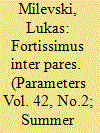

|
|
|
| 8 |
ID:
134651
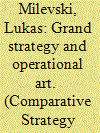

|
|
|
|
|
| Summary/Abstract |
This article examines the relationship between two concepts in strategic studies, grand strategy and operational art, to consider their aggregate effect on the fundamental concept of strategy. Grand strategy as a higher level of strategy fails to account for the entire ends-ways-means logic of strategy, thus requiring the introduction of another concept to compensate. Parallels are drawn between this conceptual dichotomy and the current practice in modern civil-military relations. Its conceptual division into two other distinct ideas is counterproductive to the fundamental task of strategy, although its practice is necessarily divided.
|
|
|
|
|
|
|
|
|
|
|
|
|
|
|
|
| 9 |
ID:
170443
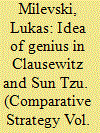

|
|
|
|
|
| Summary/Abstract |
In mutual comparison, both Clausewitz and Sun Tzu have been critiqued for their individual notions of genius and of promises of victory, respectively. Yet both critiques are beside the point, as they misunderstand both Clausewitz’s intellectual environment and the cultural milieu of ancient China in which Sun Tzu wrote. This article first provides an overview of Clausewitz’s idea of genius, particularly within the context of Enlightenment theories of war, before discussing the traditional supernatural conception of genius in ancient China, into which Sun Tzu’s work fits. The two concepts are then compared step-by-step through the process of strategic performance.
|
|
|
|
|
|
|
|
|
|
|
|
|
|
|
|
| 10 |
ID:
173165
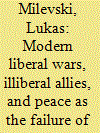

|
|
|
|
|
| Summary/Abstract |
The post-Cold War period nearly up to the present has been characterised as the age of liberal wars, yet key facets of the liberal guidance of war remain under appreciated. This article seeks to address this wider gap with regard to the particular concern of war termination and the fulfilment or failure of policy. First, it develops characterisations of liberal wars based on the existing literature, identifying three broad types through consideration of context—defensive versus offensive—and of political and strategic agency, particularly regarding the motives for and intents of action. Three types of liberal wars result: defensive liberal wars, offensive liberal wars with humanitarian motive and geopolitical intent, and offensive liberal wars with geopolitical motive and humanitarian intent. The article then presents one exemplary case for each liberal war with an emphasis on how liberal strategy required an illiberal ally and that ally's effect on the subsequent peace.
|
|
|
|
|
|
|
|
|
|
|
|
|
|
|
|
| 11 |
ID:
150114
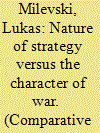

|
|
|
|
|
| Summary/Abstract |
Recent literature in strategic studies has argued for or against the idea that the world is entering an era of new types of conflict. Yet neither side of the debate appears to have considered the primary source of the character of war, which is strategy. Strategy's two main relationships (that between military power and political consequences, and that between interacting adversaries) contribute significantly toward determining the character of any war. Strategy is the basis both for understanding present wars and anticipating future wars. Although useful for defense planners and historians, for practicing strategists, “the character of war” lacks analytical value.
|
|
|
|
|
|
|
|
|
|
|
|
|
|
|
|
| 12 |
ID:
112634
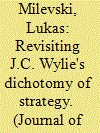

|
|
|
|
|
| Publication |
2012.
|
| Summary/Abstract |
J.C. Wylie presented his dichotomy of sequential and cumulative operational patterns in a context of effect through control, not victory or peace, as the objective of war. The author refines concepts of control presented by Rosinski, Eccles, Schelling and Corbett and presents its three facets (taking, denying, exercising) to develop a model of control as manipulation of the opponent's operational choices. This concept of control, when applied to sequential and cumulative strategy, reveals the effect each has operationally and, from there, strategically, in the primary arenas and forms of engagement (land, sea, air and cyberspace; conventional, guerrilla, terrorism, special operations).
|
|
|
|
|
|
|
|
|
|
|
|
|
|
|
|
| 13 |
ID:
188116
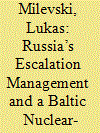

|
|
|
|
|
| Summary/Abstract |
This article examines the idea of a Baltic Nuclear-Weapon Free Zone (NWFZ) in the context of the Russian Federation’s deterrence and escalation management theories, largely as enunciated by Russian military theorists. It first introduces the history of the Baltic NWFZ idea from the early 1960s to the present proposals, and then explores Russian escalation management. The author concludes by considering how Baltic NWFZ proposals may interact with—and be understood through—the Russian military’s perspective.
|
|
|
|
|
|
|
|
|
|
|
|
|
|
|
|
| 14 |
ID:
170160
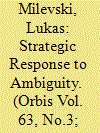

|
|
|
|
|
| Summary/Abstract |
Two different forms of ambiguity have been hallmarks of several major conflicts over the past two decades: tactical and political. These two forms of ambiguity interact differently with strategy. The first interferes with the internal logic of strategy itself, whereas the second inhibits the political choice in favor of practicing strategy, but does not inhibit strategy itself. The strategic response to political ambiguity is military force, which still works in such contexts. Any inhibitions against strategy in a politically ambiguous context are political, rather than strategic. Yet, even political objections can be minimized by relying on the West's own ambiguous forces to respond to a Russian ambiguous invasion.
|
|
|
|
|
|
|
|
|
|
|
|
|
|
|
|
| 15 |
ID:
134707
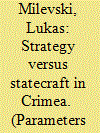

|
|
|
|
|
| Summary/Abstract |
The March 2014 annexation of Crimea may be interpreted as a contest between Russian strategy and Western statecraft. The respective natures of strategy and statecraft differ substantially, which predetermined the parameters and outcome of the Crimean crisis. This makes an excellent case study of the interaction between strategy and statecraft, and shows why strategy trumps statecraft in direct confrontations.
|
|
|
|
|
|
|
|
|
|
|
|
|
|
|
|
| 16 |
ID:
121971
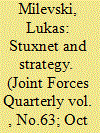

|
|
|
| 17 |
ID:
177915
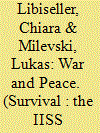

|
|
|
|
|
| Summary/Abstract |
The claim that concepts such as ‘hybrid warfare’ or the ‘grey zone’ reflect the real world better than traditional notions of war and peace does not survive scrutiny.
|
|
|
|
|
|
|
|
|
|
|
|
|
|
|
|
| 18 |
ID:
189430
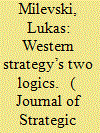

|
|
|
|
|
| Summary/Abstract |
Classical strategy as a concept encompasses two different logics (instrumentality and adversariality) as well as two different modes (decision-making and performance). In modern strategy, these modes have been on diverging paths, with varying interpretations privileging one logic above the other. Game theory focuses on decision-making, but encompasses both adversariality and instrumentality. Operational art focuses on performance, but in an adversarial context. The ends, ways, means model emphasises performance in an instrumental context. Each is imbalanced and inadequate when faced with the challenge of comprehending and controlling war. Strategic studies must make a return to balanced interpretations of strategy.
|
|
|
|
|
|
|
|
|
|
|
|
|
|
|
|
| 19 |
ID:
193543
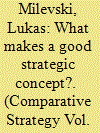

|
|
|
|
|
| Summary/Abstract |
Strategic concepts are more than simply academic concepts but must also relate to strategic practice, which affects how we should gauge concept quality. Rather than purely academic measures, strategic concepts must also be judged according to their usefulness for practice. Yet the relationship between general theory and specific practice has hardly been explored, a task this article undertakes. Academic theory generates ad hoc concepts, which are used to build specific theories of victory, which are used to generate orders. The measures by which to judge a concept’s quality depends on where in this multi-phase transference process any concept is located.
|
|
|
|
|
|
|
|
|
|
|
|
|
|
|
|
|
|
|
|
|